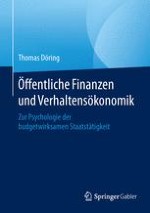2015 | OriginalPaper | Buchkapitel
2. Zentrale Erkenntnisse der Verhaltensökonomik – Zur begrenzten Rationalität des individuellen Entscheidungsverhaltens
verfasst von : Thomas Döring
Erschienen in: Öffentliche Finanzen und Verhaltensökonomik
Verlag: Springer Fachmedien Wiesbaden
Aktivieren Sie unsere intelligente Suche, um passende Fachinhalte oder Patente zu finden.
Wählen Sie Textabschnitte aus um mit Künstlicher Intelligenz passenden Patente zu finden. powered by
Markieren Sie Textabschnitte, um KI-gestützt weitere passende Inhalte zu finden. powered by
